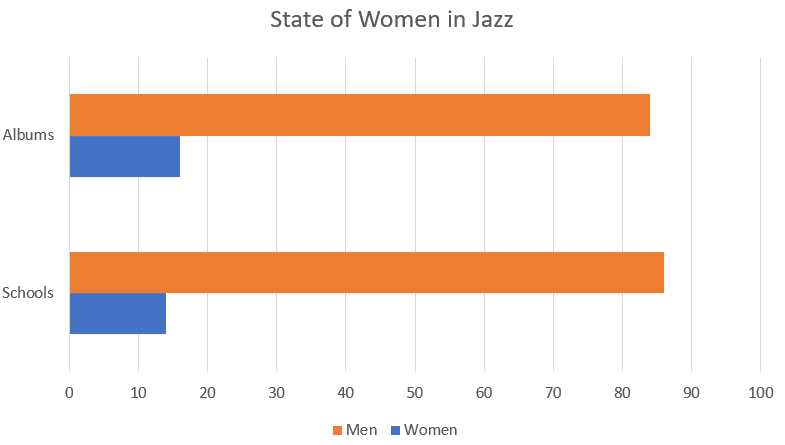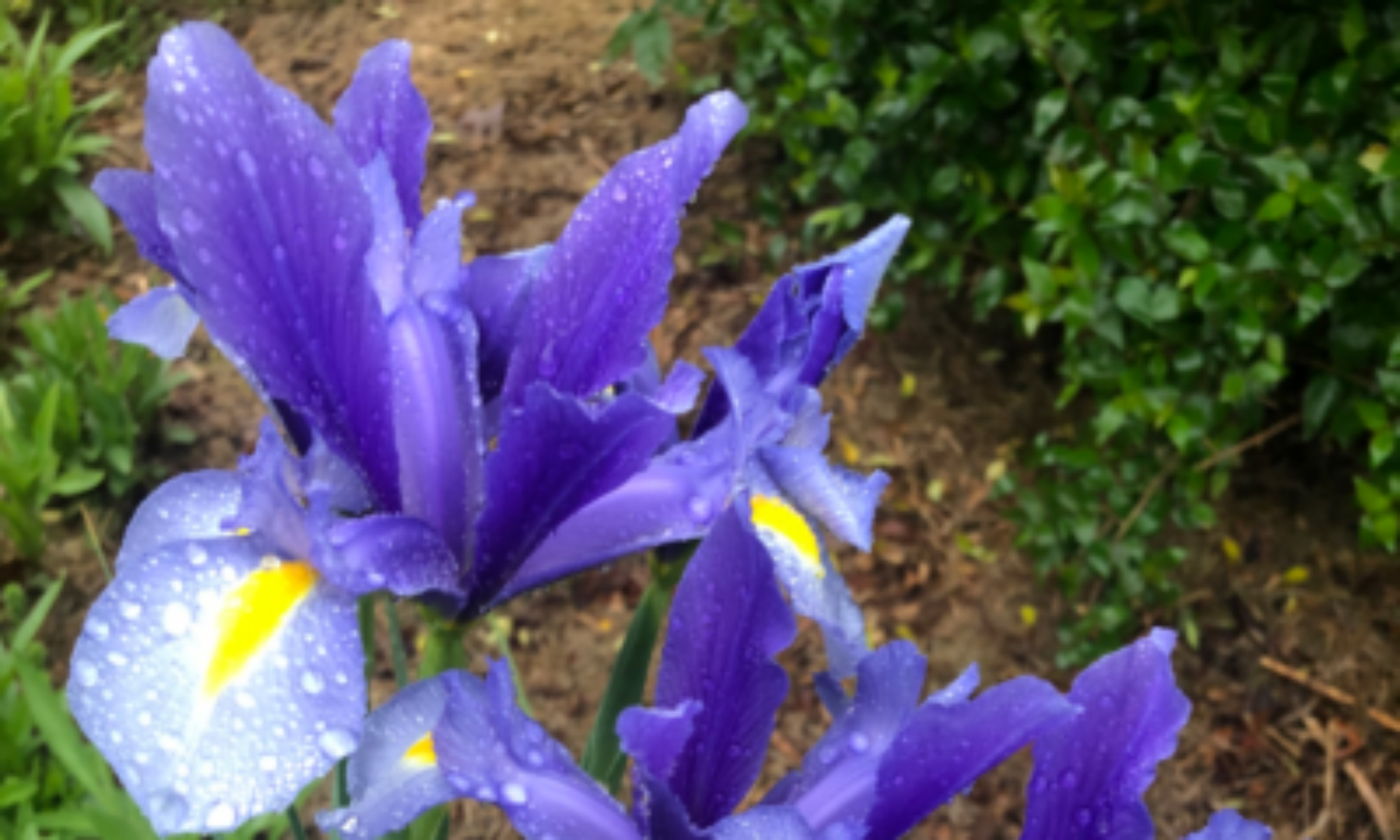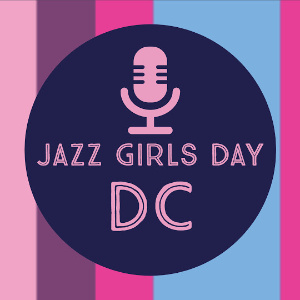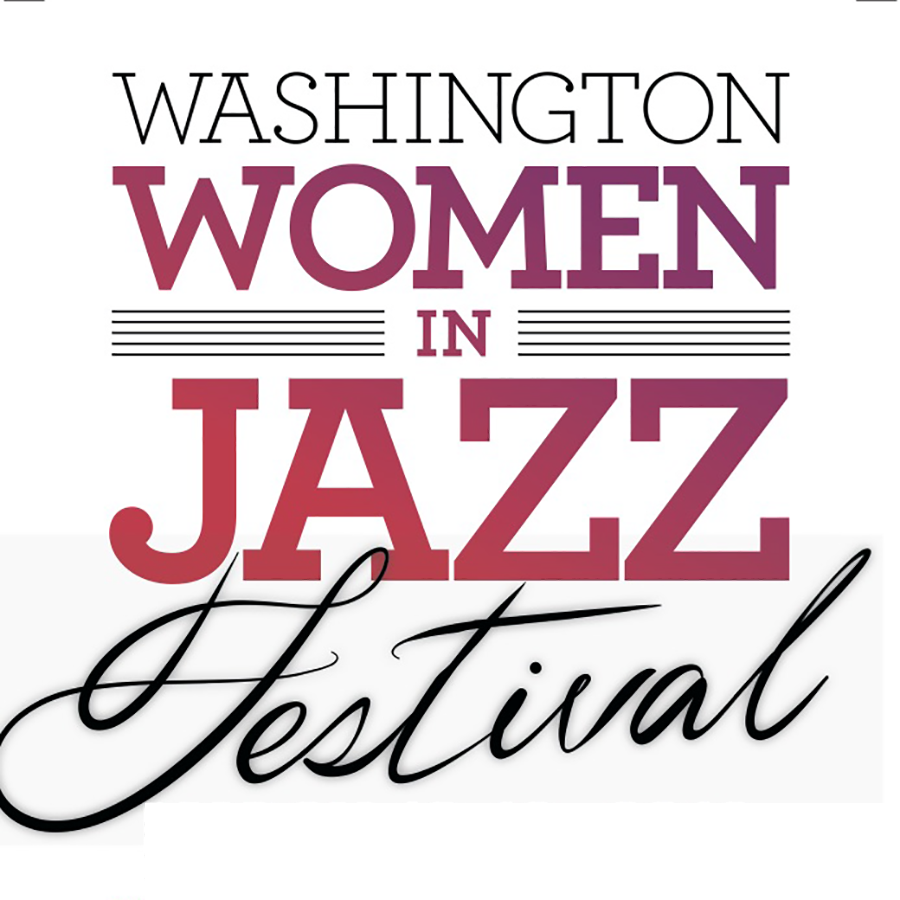According to Lucy Green (1997), gender and music education researcher, the active areas of music-making – composing, improvising, and conducting – are traditionally male, while women are left the more passive areas of accompanying and teaching. Although there may be a reluctance on women to solo and improvise due to comfort level or anxiety (Green, 1997; McKeage, 2004; Wehr-Flowers, 2006), that conclusion may be not only outdated, but it leaves out a discussion on women who are emboldened and willing to participate in an improvisation based art form and have had difficulty procuring opportunity for work. Research shows that in middle schools, about 50% of jazz ensembles are women, but only 14% are female at the college level (McKeage, 2004.) According to a study of the NPR Music Jazz Critics poll, women never made up more than 16% of the core band personnel for the albums in the 2019 poll, and the majority of jazz albums ranked included no women musicians at all (Pellegrinelli, Effinger, Elizabeth, Grunenberg, Horn, Sebesky, Weiner, 2021).

The Genderization of Instruments
Jazz began in New Orleans when marching bands melded with Storyville ragtime and blues. According to Linda Dahl in Stormy Weather, “Marching on the streets, especially with a heavy brass instrument, just wasn’t considered appropriate behavior for girls. Even when the bands performed and used pianos (which was and still is the most common instrument taught to girls), many of the mothers just wouldn’t let the girls join them.” One of the reasons there are very few women instrumentalists and composers in jazz is partially because of the “genderization” of instruments. It wasn’t “Lady like” to play a brass instrument in the early 1900s, and the remnants of the “genderization” of instruments persists today manifested in jazz ensembles across the United States. It is important to incorporate diversity, equity, and inclusion in band recruitment sessions. Band directors should be willing to move a girl to the upright bass if that’s what they want to play. Women should be given the opportunity to play lead trumpet as there is no physical difference that would make it more difficult to play high. There is nothing a women can’t do on an instrument, and the size of the instrument is not a determining factor in success. Motivation, drive, discipline, and interest should be prioritized over gender norms.
Jazz Culture
Jazz is an apprenticeship system, where typically young musicians are hired by older musicians to gain experience before going out on their own. The majority of bandleaders, however, do not hire women, making it difficult for women to gain experience, contacts, and access to professional recognition (Pellegrinelli, Effinger, Elizabeth, Grunenberg, Horn, Sebesky, Weiner, 2021).
Additionally, women are often treated disrespectfully even if hired or leading the band. According to the Keychanges report published by the Cheltenham Jazz Festival in the United Kingdom, female jazz ensemble leaders reported sexual harassment by venue owners and industry professionals in December 2020 as part of the Cheltenham jazz festival (Edwards, 2021). The history of disrespect is not new, however, as evidenced by the stories told by Melba Liston on tour in the 1940s and 1950s, as the jazz industry had (and possibly still has) a “high tolerance of sexual assault” (Johnson, 2015). Jazz musicians should be able to pursue their art without having to fit into genderized norms.
Sources:
Dahl, L. (1984). Stormy Weather The Music And Lives of A Century of Jazzwomen. New York: Pantheon Books.
Edwards, Tina. “Female UK Jazz Musicians Face Sexual Harassment and Discrimination, Says Report.” The Guardian, Guardian News and Media, 16 Feb. 2021, https://www.theguardian.com/music/2021/feb/16/female-uk-jazz-musicians-face-sexual-harassment-and-discrimination-says-report.
Green, L. (1997). Music, gender, education. Cambridge, England: Cambridge University Press.
Johnson, David. “Proving Herself: Melba Liston, Arranger and First Lady of Trombone.” Indiana Public Media, 15 June 2015, https://indianapublicmedia.org/nightlights/proving-melba-liston-arranger-lady-trombone.php.
McKeage, K.M. (2004). Gender and Participation in High School and College Instrumental Jazz Ensembles. Journal of Research in Music Education, 52(4), 343.
Pellegrinelli, Lara, et al. “Equal at Last? Women in Jazz, by the Numbers.” WAMU 88.5 American University Radio, NPR, 12 Jan. 2021, https://www.npr.org/2021/01/12/953964352/equal-at-last-women-in-jazz-by-the-numbers.
Raine, Sarah. “(PDF) Keychanges at Cheltenham Jazz Festival: Challenges for Women Musicians in Jazz and Ways Forward for Equal Gender Representation at Jazz Festivals.” ResearchGate, Cheltenham Jazz Festival, 1 Dec. 2020, https://www.researchgate.net/publication/348501420_Keychanges_at_Cheltenham_Jazz_Festival_Challenges_for_women_musicians_in_jazz_and_ways_forward_for_equal_gender_representation_at_jazz_festivals.
Wehr-Flowers, E. (2006). Differences between Male and Female Students’ Confidence, Anxiety, and Attitude toward Learning Jazz Improvisation. Journal of Research in Music Education, 54(4), 337.


